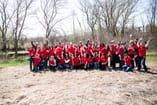I wrote recently in a post for NBC Chicago that coworking spaces were on the rise due to the increase in freelancers and remote workers. While I still believe this is true, I'd like to explore that idea and put it into context with an oft-mentioned notion that our new economy will be built upon a specialized workforce.
Over the past 5 years I've co-founded a makerspace (hackerspace), a game developer non-profit in Chicago, and most recently a coworking space in the south suburbs called SpaceLab 1. All three of these organizations have had a few things in common, chiefly amongst them: the emphasis on an open community, a focus on knowledge-sharing, and an eclectic and talented membership. When done right, the result is a group that pushes its members to advance learning in areas outside their expertise.
The idea that you grow as an individual by expanding your knowledge outside your comfort zone isn't a new one, but it's one that's been tossed aside in recent history for favor of a more "specialized" worker. The idea goes that, as technology continues to advance, the general workforce must specialize in order to keep up. And if you aren't a specialized worker, good luck getting a job in the 21st century.
I think this is a wrong-headed way of looking at where things are going.
While speaking with some friends recently about the characteristics we look for in potential employees or interns, I noticed a lot of recurring themes. We needed a programmer who understood design principles, or a designer who understood how to market a product. We weren't looking for specialists, but polymaths. When you're a small company just starting out, you don't need the best programmer, or marketing person, or designer in the business. What you need is someone whose skills are transferrable to other facets of your company. Or to put it another way, when there are only 3 of you at a company, you better be able to wear multiple hats. Even if you aren't bald.
Coworking spaces and makerspaces provide the perfect place for these skills to germinate, and new ideas to take place. Can't figure out an API to Facebook? Ask the guy who does APIs for Somecompany X who sits next to you every day. Maybe you're trying to come up with an idea on how to build a small and private shared storage service for your company, and recall that class you took on Raspberry Pis and networking a few weeks ago. Or perhaps you're a business owner who wants their employee to prototype out a new physical product, and voila, they have access to a 3D printer through the space they're a member of.
These are all real-world examples of things I've seen these spaces enable.
The point is, as high-tech continues to push forward into territory that requires a specialized workforce, there's still plenty of room for the polymath to succeed. Coworking communities are not just popular because of the free printing and internet access, they're popular because they enable individuals, as well as small business owners and employees of small businesses, to work around other multi-talented people. In short, coworking spaces and makerspaces turn individuals into better-equipped employees and business owners.





